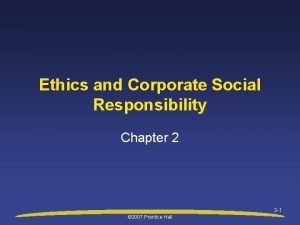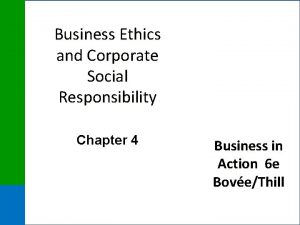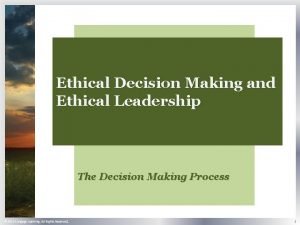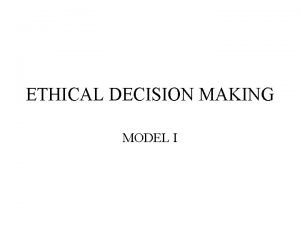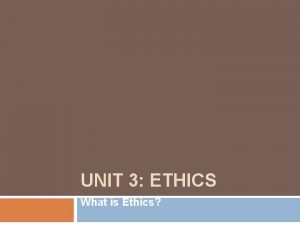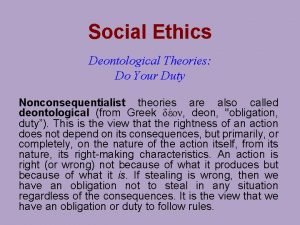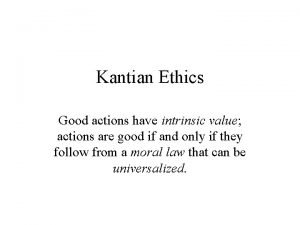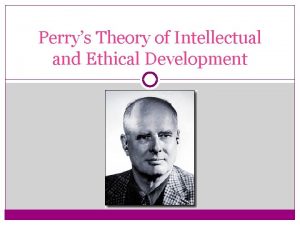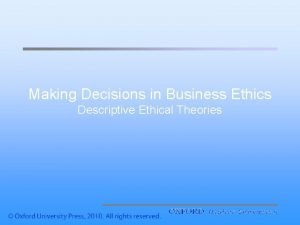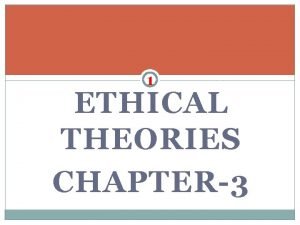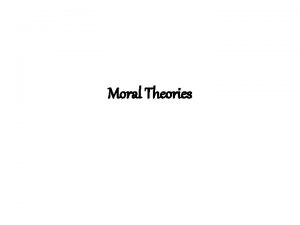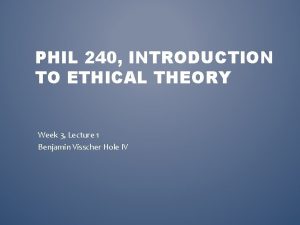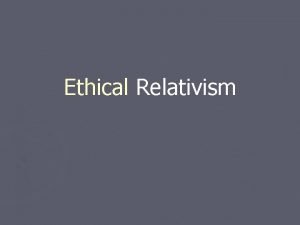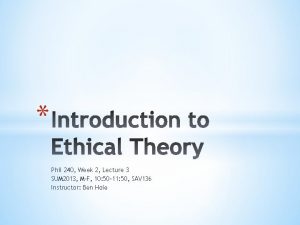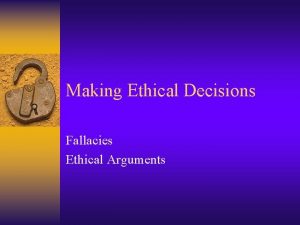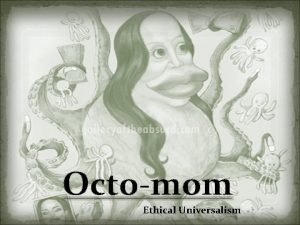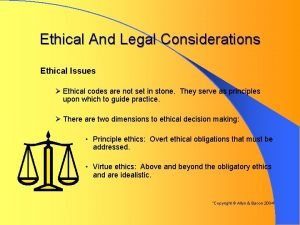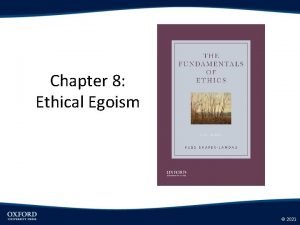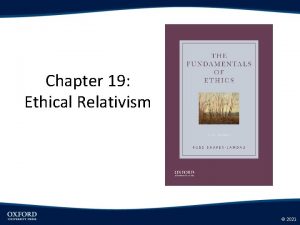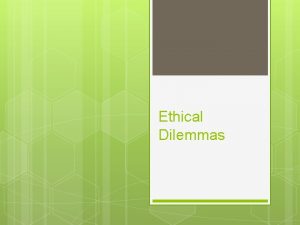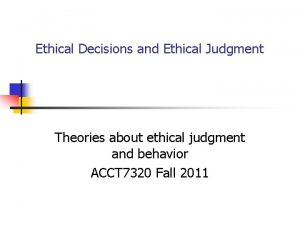Introduction to Ethical Theory Phil 240 Week 1















- Slides: 15

Introduction to Ethical Theory Phil 240, Week 1, Lecture 2 SUM 2013, M-F, 10: 50 -11: 50, SAV 136 INSTRUCTOR: BENJAMIN HOLE

Agenda 1. Introduction to Plato’s Republic 2. Clicker Quiz 3. Overview of the Immoralist’s Challenge 4. Discussion

Plato’s Republic “Plato's Republic centers on a simple question: is it always better to be just than unjust? The puzzles in Book One prepare for this question, and Glaucon and Adeimantus make it explicit at the beginning of Book Two. To answer the question, Socrates takes a long way around, sketching an account of a good city on the grounds that a good city would be just and that defining justice as a virtue of a city would help to define justice as a virtue of a human being. ” http: //plato. stanford. edu/entries/plato-ethics-politics/

QUIZ Please set your Turning Technology Clicker to channel 41 Press “Ch”, then “ 41”, then “Ch”

1. Socrates claims that justice is: A. Good for its own sake. B. Good for its consequences. C. Both A and B D. Neither A nor B

2. Glaucon claims that justice originates from: A. Social agreement B. The gods C. Nature D. Pleasure E. The forms F. Nowhere, because it doesn’t exist

3. To show that justice is choice-worthy Socrates considers A. The effects of justice on the soul B. What its very presence in the soul does to a man C. How its very possession benefits a man D. How justice in itself is best for the soul itself E. All of the above F. None of the above

Three Type of Values • Intrinsic Value: things that are good for their own sake, such as pleasure • Instrumental Value: things that are good for the sake of their consequences, such as money • Both: things that are good both for their own sake and the sake of their consequences, such as health

Three Type of Values • Intrinsic Value: things that are good for their own sake, such as pleasure • Instrumental Value: things that are good for the sake of their consequences, such as money • Both: things that are good both for their own sake and the sake of their consequences, such as health • Glaucon’s challenge to Socrates is for him to show that justice is both intrinsically and instrumentally valuable. • Glaucon and Adeimantus argue that justice is only instrumentally valuable. • Therefore, it cannot be both intrinsically and instrumentally valuable.

Three Type of Values • Intrinsic Value: things that are good for their own sake, such as pleasure • Instrumental Value: things that are good for the sake of their consequences, such as money • Both: things that are good both for their own sake and the sake of their consequences, such as health The Challenge 1. When one can be unjust without penalty one will choose to be unjust. 2. So, justice is only praised for its instrumental value. 3. If one premises 1 and 2 are true, then justice is not intrinsically valuable. 4. So, justice is not intrinsically valuable. 5. Therefore, justice is not both kinds of value.

The Challenge The Ring of Gyges • Suppose you found a ring which if you turned in a certain direction it made you invisible. As a consequence of being invisible, you can do anything you want without there being a penalty for your actions because you could never be discovered.

If I found the ring of Gyges, I would remain a just person. A. B. C. D. E. F. G. Strongly Agree Somewhat Agree Neutral Somewhat Disagree Strongly Disagree

Suppose that Gyges finds, not one ring, but two. Both rings have the same magic power. Put yourself into Gyges’ sandals, and imagine that your conception of happiness is the same as his. What would you do with the second ring? You will need to start by explaining Gyges’ conception of happiness. A. Keep, hide or destroy the ring so nobody else can use it against you B. Give the ring to somebody else C. Other

What is Gyges’ conception of happiness? Conceptions of happiness • Hedonism (happiness consists in the enjoyment of pleasure) • Desire Satisfaction Theory (happiness consists in the satisfaction of desire) • Happiness as eudaimonia (Plato, Aristotle) Critically evaluate Gyges’ conception of happiness

Which ethical theory (from the Timmons reading) gives the best rationale for behaving morally, regardless of whether such behavior would benefit you? A. B. C. D. E. F. G. H. Consequentialism Kantian Ethics Natural Law Theory Rights Based Moral Theory Virtue Ethics Prima Facie Duties Divine Command Theory Cultural Relativism
 Week by week plans for documenting children's development
Week by week plans for documenting children's development Perbedaan ethical dilemma dan ethical lapse
Perbedaan ethical dilemma dan ethical lapse Ethical lens of the ethical reasoning model
Ethical lens of the ethical reasoning model Perbedaan ethical dilemma dan ethical lapse
Perbedaan ethical dilemma dan ethical lapse Ethical habits
Ethical habits Introduction to ethical decision making
Introduction to ethical decision making Moral ethics examples
Moral ethics examples Kant’s ethical theory
Kant’s ethical theory Act utilitarianism
Act utilitarianism Normative ethical theory examples
Normative ethical theory examples Example of hypothetical imperative
Example of hypothetical imperative Perry's theory of intellectual and ethical development
Perry's theory of intellectual and ethical development Descriptive business ethics theories
Descriptive business ethics theories Ethical theories definition
Ethical theories definition Define ethical relativism
Define ethical relativism Phil collins choroba
Phil collins choroba

